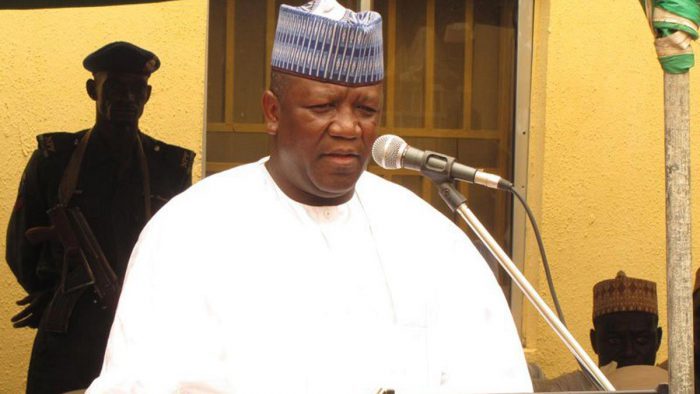
Overshadowed by Boko Haram’s infamous acts of atrocity, the horror being suffered by the people of Zamfara State has attracted far less attention than it deserves. Aside from the frontline states of Borno, Yobe and Adamawa, currently under the spell of the religious extremists’ attacks, and perhaps the Middle Belt states troubled by murderous Fulani herdsmen, very few places in the country suffer the level of routine massacre and downright outlawry being experienced in Zamfara State.
It has come under the siege of non-state actors who commit diverse crimes, including kidnapping, wanton killings, cattle rustling and rape of young girls and even housewives, who are usually taken away right in the presence of their parents or husbands. “They are sexually harassing our women. Sometimes, they would ask a resident to take his daughter or wife to their camp … No one dares to stop them,” a certain Musa Ali of Sububu village, reportedly said. Their plan is to father children who would be born as bandits.
In acts that could only have played out in ungoverned territories or failed states, the bandits levy villages hefty sums of money, usually running into millions of naira, for protection. Villagers either flee their homes upon the receipt of such notices or make arrangements to defend themselves against the assailants or pay up. Their invasions, featuring hundreds of bandits on motorcycles, have led to the sacking of many villages and killing of security men and villagers, including women and children. They are usually followed by unprecedented levels of destruction, looting and cattle rustling.
But Governor Abdulaziz Yari is never one to flinch from speaking frankly about the daunting security challenge in his domain. He has used every podium to proclaim it. Recently, he told journalists in one of his most vivid presentations how well equipped the bandits ransacking his state were and how offers of amnesty made to them had been spurned.
Perhaps only a country that is both helpless and incapable of defending her territorial integrity or is unperturbed by rising human tolls that would overlook the level of bloodshed being suffered by the Zamfara people. “They (the bandits) are in control of the kind of weapons that the command in Zamfara State does not have. In one armoury alone, they have over 500 AK-47 (assault rifles); we saw it. Our people were even given the chance to take pictures,” Yari said of his tormentors.
Analysing their modus operandi, the governor, who is also the Chairman of the Nigeria Governors’ Forum, said they usually sought dialogue during the dry season when all the bushes dried up and there was nowhere for them to hide, but “when the rainy season comes and all the forest becomes thicker, they will return to their normal practice.” This is a clear case of the bandits making a fool of the Nigerian state.
Yari’s lamentations are neither new nor surprising; he once stated his readiness to embrace a state of emergency in Zamfara, promising to abdicate his seat as governor if doing so would restore normalcy. His revelation about how well-armed and confident his tormentors are, brings to mind a similar lamentation by the Governor of Borno State, Kashim Shettima, who in 2014 said, “Boko Haram are better armed and better motivated than our troops.”
But, despite the apparent weakness in the current counter-insurgency approach, the Nigerian government has refused to ring the changes in the country’s security design. With conflicts in practically every nook and cranny of the country, the government has continued to rely mainly on military might, which is already overstretched, while state governors, constitutionally vested with the power to provide security for the states, remain toothless bulldogs. This has to change.
Security should not be politicised. State governors should act creatively to protect their people. If the Federal Government refuses to approve state policing, governors should devise other security outfits that could serve their states without flouting the constitution. They should function within the existing structure to make the states and, by extension, the country safer. States like Kano already have hisbah, a religious police.
Already, states have been known to spend so much in supporting the existing security agencies in the job of providing security. For example, Zamfara State Government claims to have shelled out a whopping sum of N17 billion to support the existing security structure that has not provided an effective security in the state, according to the Secretary to the State Government, Abdullahi Shinkafi, in August last year.
Shinkafi said, “In 2011, we provided 457 vehicles for security agencies; in 2012, we provided 2,250 (and) in 2014, 77 vehicles.” Between 2015 and 2018, he said the state also made available to the security outfits 50 vehicles each year. This is enough to equip some local security or vigilance groups, who actually understand the terrain and are better suited to confront the bandits wreaking endless havoc on the state.
In other climes, crime-busting continues to change as the society becomes more sophisticated and more cosmopolitan. In 2015, for instance, the United Kingdom came up with the concept that new entrants into the police should be able to speak a second language. Among the languages in consideration was Yoruba. Others included Italian, Spanish, Arabic Polish, German Turkish and Greek.
In the same manner, if the current single police structure in the country has failed to live up to expectation, there is no reason why it should not be reviewed. This is the right time to devolve policing in Nigeria because the level of crime has become more sophisticated and there is the need to have more indigenous people involved in local policing.
END

Be the first to comment